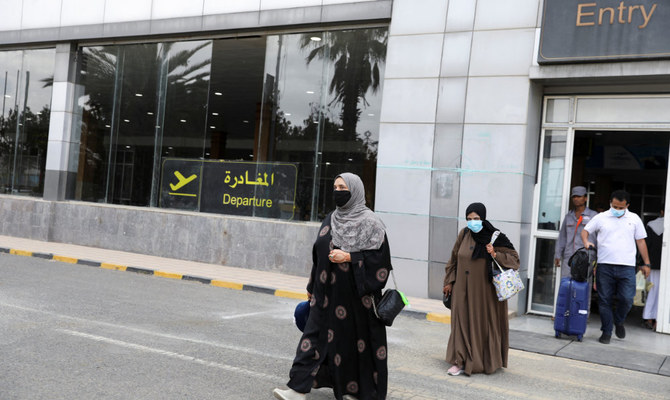Yemen's govt proposes passport office in Sanaa
Thu 28 Apr 2022, 12:36:22

Al-Mukalla: The internationally recognized government of Yemen on Wednesday proposed to open official passport offices in Houthi-controlled Sanaa and other areas so that citizens could get access to travel documents, a move it said could end the deadlock over commercial flights from territory controlled by the militant group.
The first commercial flight scheduled to take off from Sanaa airport to Amman on Sunday was indefinitely postponed after the Iran-backed Houthis added dozens of passengers with unauthorized passports.
The government accused the Houthis of attempting to provide fake passports to military experts and fighters from Lebanon and Iran, so that they could leave the country. The Houthis had refused to allow 104 passengers on the aircraft to leave Sanaa, and insisted on including 60 people with documents issued in their territories.
To end the impasse, Muammar Al-Eryani, Yemen’s minister of information, culture and tourism, proposed that his government opens a new passport office at Sanaa airport, in coordination with the office of the UN’s Yemen envoy.
If the Houthis agree to this offer, the office could be fully operational in 10 days, the Yemeni minister said. The government would also provide special booths in areas under its control for those from Houthi territory seeking travel documents.
Al-Eryani urged the Houthis to allow passengers with official documents to fly from Sanaa airport to Amman, promising to help those with Houthi-issued passports to get new ones issued by the government.
The Houthis have rejected the offer and accused their opponents of violating Yemeni law and the UN-brokered deal.
Hussein Al-Ezzi, a Houthi official, said that the country’s laws allow citizens “the right to obtain a travel document from any province” in Yemen, including areas under their control.
But government officials say that issuing passports is a function of a legitimate administration.
The postponement of the first commercial flight has triggered
outrage among thousands of Yemeni people seeking medical help, and prompted the UN’s Yemen envoy, Hans Grundberg, to set up a meeting between the parties so that a solution could be found.
outrage among thousands of Yemeni people seeking medical help, and prompted the UN’s Yemen envoy, Hans Grundberg, to set up a meeting between the parties so that a solution could be found.
Under the two-month-long UN-brokered truce that took effect on April 2, Yemen’s national carrier, Yemenia, would fly twice weekly from Sanaa airport to Amman and Cairo; while at least 18 ships carrying fuel would be allowed to enter Hodeidah seaport. The Houthis and the Yemeni army had agreed to stop fighting on all fronts and open roads in provinces, including lifting the Houthi siege of Taiz.
However, the Houthis have repeatedly violated the ceasefire agreement by continuing to mobilize forces and attacking Marib city, while also directing some of its supporters to conduct raids in Taiz.
On Wednesday, a government committee formed by the Presidential Leadership Council to handle the Houthi’s seven-year siege of Taiz, called on the UN envoy to order the Houthis to open main roads that link the densely populated city with Sanaa, Hodeidah and Aden, and to hand over maps that show the location of landmines.
“As a committee approved by the legitimate government, we demand that you order the other party (Houthi militia) that besiege Taiz province to quickly open all main roads leading to Taiz city and link it with other provinces,” the committee said in a letter to the envoy’s office.
Separately, local media reports said that at least four people were killed when torrential rain and floods hit parts of Yemen over the past 48 hours. Khaled Al-Shajani, the deputy head of Marib’s office assisting internally displaced people, said that at least 20 families were sleeping rough after the floods washed away their tents.
The heavy rain also partially ruined tents and spoiled the food of about 40 other families, the Yemeni official said. Yemen’s National Meteorological Center on Wednesday said that more heavy rain and thunderstorms were expected, and warned people from crossing flooded areas and driving in low-visibility conditions.
No Comments For This Post, Be first to write a Comment.
Most viewed from International
Most viewed from World
AIMIM News
Delhi Assembly polls: Owaisi leads Padyatra in Okhla
Feb 01, 2025
We reject this Waqf Amendment Bill: Asaduddin Owaisi
Jan 30, 2025
Latest Urdu News
Most Viewed
May 26, 2020
Which team will win the ICC Men's Champions Trophy 2025 held in Pakistan/Dubai?
Latest Videos View All
Like Us
Home
About Us
Advertise With Us
All Polls
Epaper Archives
Privacy Policy
Contact Us
Download Etemaad App
© 2025 Etemaad Daily News, All Rights Reserved.

.jpg)

.jpg)







.jpg)
.jpg)
.jpg)
.jpg)
.jpg)
.jpg)
.jpg)
.jpg)
.jpg)
.jpg)
.jpg)




















